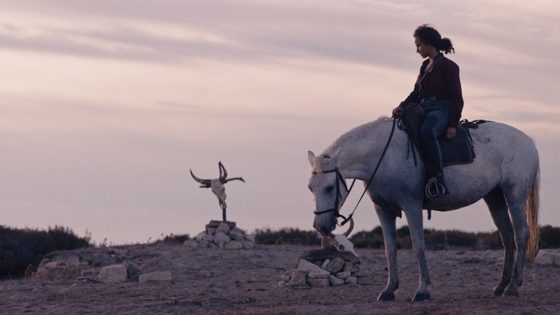From Jekyll and Hyde to the Wolfman, to much more recent twists on atavistic transformations, the concept of shape-shifting has always been a popular one in fiction — with storytellers turning the dial up or down on the potential social commentary therein, according to taste and preference. In “Animale,” the closing film of this year’s Cannes Critics’ Week section, director Emma Benestan is rather more interested in the interpersonal dynamics navigated by 22-year-old female bull-runner Nejma (Oulaya Amamra) than in really savouring some promising horror implications. She gives Dr. Jekyll center stage, as it were, rather than getting too involved with Mr. Hyde.
Nejma works at a ranch in Camargue, France, where bulls are raised to compete in the arena for baying crowds of exhilarated spectators. It is a traditionally masculine environment: From the bulls to the men who wrangle them, the emphasis is on displays of physical strength and ferocity. It’s hardly the place for a young woman, at least in the eyes of some of the men who work there. Others are keener on her presence, but that’s certainly not because they are feminists. Nejma represents an opportunity for, at very best, some off-colour teasing. More sinister subtexts are not difficult to parse from the get-go.
It’s not only the ranch-hands who struggle with the notion of Nejma’s chosen line of work. Her mother expresses concern that she could be gored in the abdomen, which seems a fair point, until she adds the wild corollary that it could prevent Nejma from having children in the future, which feels like the last thing you would be worried about at the moment of impact. The filmmaking is at its most successful when it moves away from dialogue-driven sequences and into the more visual, visceral aspects of Nejma’s chosen line of work. The bulls are filmed beautifully by DP Ruben Impens (“Titane,” “The Eight Mountains”), giving equal space to both the danger and power of these fierce creatures, and also to their status as victims, subjugated by mankind.
Lead actor Amamra, who made a splash at Cannes in 2016 in Houda Benyamina’s “Divines,” navigates a similar dichotomy. Her character has power, of a sort, but also embodies a deep vulnerability. Her power derives partly from the automatic distinction of being the only woman on the scene, giving her a kind of local celebrity. But with that spotlight comes pressure — the perception that if she fails, it’s because she’s a woman, whereas her male counterparts are allowed to fail or succeed as individuals on their own merit. Ultimately, accepting the terms of this environment proves something of a trap for Nejma, who finds herself playing by the rules of the societal microcosm in which she finds herself, rather than reshaping the game. Parallels with the situation of the bulls in the ring are clear.
It’s not within the scope of this character-driven drama to get into a deep debate about the appeal or ethics of the wide variety of bull-related sports. But perhaps the film’s stance can be inferred from the choice of “course libre” or “course camarguaise” bullfighting, which is not meant to cause injury to the animals involved; instead, the runners compete to snatch rosettes from the heads of charging bulls. This helps keep Nejma’s ambitions sympathetic to modern audiences, many of whom would probably not concur with the snappy Spanish characterization employed by Ernest Hemingway (and further popularized and later renounced by Orson Welles) of bullfighting as “indefensible but irresistible.” It’s not unfamiliar territory for Benestan, whose knowledge of the subject is informed by her 2021 documentary “Fearless Girl,” about female bull-runner Marie Segrétier.
In addition to its more general animal-transformation lineage, “Animale” joins the ranks of films exploring the monstrous feminine, a popular arthouse body-horror subgenre. (In Critics’ Week alone in recent years, we’ve had “Tiger Stripes,” “Raw” and “When Animals Dream.”) The female body provides a fertile canvas for these narratives of animalistic impulses unleashed, but for filmmakers gearing up to pitch a film along these lines, it’s probably worth considering quite carefully what fresh angle you’re able to bring to the setup. The idea of female rage or trauma inspiring a physical transformation of some sort is certainly a juicy one, but at some risk of being wrung dry.
Source Agencies

